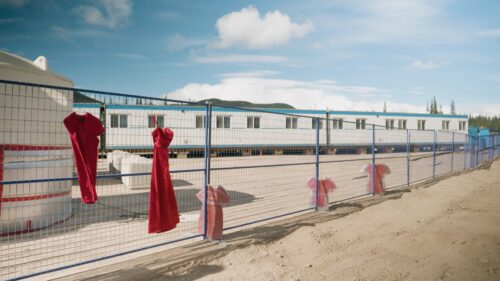
FOR IMMEDIATE RELEASE – Wet’suwet’en Women Urge Dr. Bonnie Henry to Shut Down Industrial Camps Amid Covid Outbreaks
November 30, 2020 – Smithers (BC) – Wet’suwet’en women have penned an open-letter to Dr. Bonnie Henry urging British Columbia to designate oil and gas work as non-essential amid Covid outbreaks and cases at LNG Canada and Coastal Gaslink facilities.
“We understand that the province has declared oil and gas work an essential service, however, we strongly encourage you to reconsider,” the open letter states. “The economy cannot come before Indigenous lives.”
43 confirmed cases of Covid 19 have been tied to an LNG Canada facility in Kitimat, while Wet’suwet’en have been informed of 2 confirmed cases of Covid 19, with six individuals in self isolation, at Coastal Gaslink’s Camp 9A on Unist’ot’en yintah (territory). Man camps do not have capacity to isolate all Covid positive workers and send them home to self isolate, where many must cohabitate with elders and other community members.
Wet’suwet’en Chiefs, elders, and members are subject to ongoing surveillance and harassment by Coastal Gaslink’s private security contractors and the RCMP, who in many instances do not wear masks or refuse to observe safe distances when interacting with our community members. Our Chiefs and elders are concerned about contracting the virus from workers on the territory and are limiting their travel on our yintah.
“Making a conscious decision to bring transient workers into our territories and communities is telling us that the economic gain of the province or state is more important than our language and cultures. You are telling us that the economic gain of the province is more important than our lives. Your behaviour and attitude facilitates the states’ genocide of our people and lands.” the letter continues.
Dr. Bonnie Henry was previously urged by Dr. David Bowering, former Chief Medical Health Officer for Northern Health, to “immediately shut down the industrial work camps” early in the pandemic. In a March 28 open letter, he wrote: “The camps are and will be COVID-19 incubators placing the workers, the host communities, and the home communities of the workers at unacceptable risk.”
The Wet’suwet’en women conclude by outlining a path forward and an opportunity for meaningful reconciliation in British Columbia’s pandemic response:
“This pandemic has vastly changed the way society functions. Many of these changes have benefited families, communities and the land. Society had to adjust to new norms. Some have been difficult and others have been welcome. We see this as an opportunity to change the way Indigenous people are treated from less than human and unworthy of protection to the valuable community members that we are.”
OPEN LETTER:
Urgent Concerns from Wet’suwet’en Ts’ako ze’ and Skiy ze’
MEDIA CONTACTS:
Howilhkat, Freda Huson
Unist’ot’en Spokesperson
tsewedielh@gmail.com
Sleydo’, Molly Wickham
Gidimt’en Checkpoint Spokesperson
yintahaccess@gmail.com
Photo: Red dresses at Camp 9A on Unist’ot’en territory, where there are multiple confirmed cases of COVID-19.


